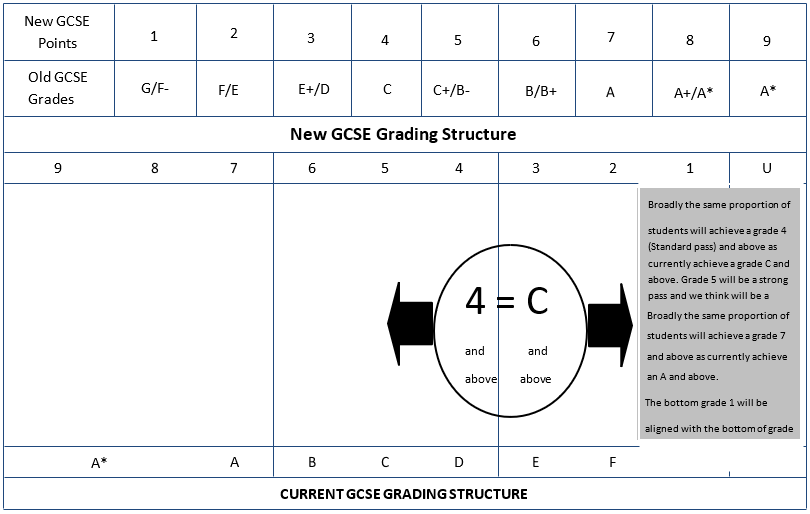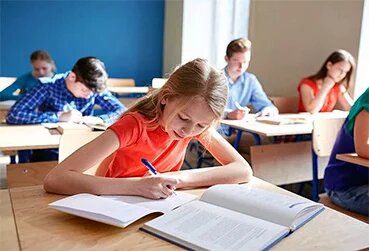GCSE Year 10 Book Now

Year 10 is where your GCSE phase starts. You need to study for two years and then appear for exams at the end of Year 11 to pass your GCSEs. With new curriculum structure, a student needs to prepare for the subjects they have chosen in year 10 and year 11. Some students give GCSEs for some subjects in year 10 only. But Most of the students appear at the end of Year 11.
GCSE GRADING SYSTEM
Current Year 10 students will study GCSE’s in all subjects, mandatory and chosen one. GCSE’s will be graded using the numerical 1 to 9 system. The diagram below shows the appropriate comparison between the current GCSE grading system and the old ‘legacy’ system.

This new grading system is simpler but doesn’t have much pattern to establish as of now.
Exam Boards:
There are five exam boards. All your courses will be studied and assessed through one of these. They are:
OCR (www.ocr.org.uk)
AQA (www.aqa.org.uk)
EDEXCEL (www.edexcel.org.uk)
WJEC (www.wjec.co.uk)
EDUQAS (https://eduqas.co.uk/ )
At Champs Learning we offer tuition in 5 subjects:
1. Maths
2. English
3. Physics
4. Chemistry
5. Biology
Session Plan: We understand that we have one hour per subject per week as compared to more than 5 hours per subject at a school. Thus, the curriculum is well structured to accommodate all the important topics from each subject. Curriculum for each subject is spread over 42 weeks. So for every subject we have 42 teaching sessions.
Books:
The session plan for year 10 is structured with 8 books for each subject and 8 topic tests. Each book is further divided into 4 weeks and every 5th week, we conduct an assessment on that book or topic. All the content including books and tests are designed by faculties at Champs learning. The session plan is made flexible to accommodate extra time for doubt solving and also for challenging content for higher set of students.
Our books are concept and exercise books. Only Champs Learning have created these books as per the topic for each subject. It becomes very helpful for a student to revise a particular topic.
Assessment: After every concept or book, we conduct an assessment. This normally has a cycle of 4 weeks. This gives a fair idea to a student and teacher about the depth of understanding. Accordingly, teacher adapts his teaching sessions. We do also conduct end of the year assessment and conduct a detailed feedback session on these exams.
Class size: All the classes for GCSE and Key stage 3 at Champs Learning have small groups of students. This helps teachers to attend each student individually and engage for every subject. Students in small groups enjoy the advantage of personal attention and also the benefits of common queries or doubts.
Teachers: All the teachers at Champs Learning for GCSE are PGCE qualified and have secondary school teaching experience. They are subject matter experts and teach their subject individually. All of them follow Champs Learning books and the boards for which student preparing for.
Success: All our students have been achieving high grades from 7 onwards consistently. We are proud of them. Each student gets personal attention for his academic progress and mentored for high success in the final exams.
- Operations on Mixed Fractions
- Comparing Fractions,Ordering Fractions
- Recurring Decimals & Fractions
- Expressing One Number as a Fraction of another Number, Relation Between Fractions, Decimals & Percent
- Sequences(Deciding if a Term is in Sequence,Finding next terms in given sequence)
- Algebra with Inequalities(Showing Inequality on Number Line, Solving Quadratic Inequalities)
- Graphical Inequalities
- Percentage(Finding the percent change,Reverse Percentage)
- Percentage (Find % of an Amount,Finding x % of y without using calculator,New amount after a % increase or decrease,Simple Interest)
- Compound Growth and Decay
- Direct and Inverse Proportion
- Angles in Parallel Lines
- Angles in Polygons
- Area – Triangles and Quadrilaterals
- Area and Perimeter of Compound Shapes
- Probability Basics (All Probabilities are between 0 and 1, Probability Using a formula,Probability Add Up To 1,
- Probability(List All Outcomes,Use the Product Rule to count outcomes,Relative Frequency
- Probability (Record Results in Frequency Trees,Use Probability to find an “Expected Frequency”)
- Probability ( Independent and Dependent Events,The AND Rule,The OR Rule)
- Coordinate Geometry(Midpoint Formula, Use Ratios to find coordinates,Gradient (Slope) of a straight line)
- Coordinate Geometry (Different forms of Equation of Straight Line)
- Coordinate Geometry (Graphing Vertical and Horizontal Lines, straight line graphs)
- Real-Life Graph
- Congruent Shapes, Similar Shapes
- The Four Transformations
- Drawing in Maths
- Loci and Construction, Bearing
- Box Plots
- Cumulative Frequency
- Histogram and Frequency Density
- Stem and Leaf Diagram
At a glance
GCSE English Literature, and GSCE English Language (along with all other subjects) have been redesigned to become more demanding, bringing the UK’s 16 year old school-leavers up to par with international standards.
English Language GCSE (9-1)
Firstly, there are no set texts for
the new English Language syllabus;
pupils are expected to read a “wide
range of texts” from the 19th, 20th
and 21st century (a timely reminder to
ensure that your child is reading for
pleasure at home, from the earliest
age possible!)
The reading assessment will comprise
50% of the new exam, and will be based
on unseen texts from the past three
centuries, both fiction and
non-fiction. Pupils will be expected
to evaluate the writer’s choice of
vocabulary, form and structural
features.
The writing assessment makes up the
second 50%, with pupils expected to
write clear and coherent texts. A
weighty 20% of the marks for this exam
are awarded for range of vocabulary
and sentence structures, spelling and
punctuation (an extension of the
previous SPaG marks – spelling,
punctuation and grammar).
There will continue to be a speaking
and listening examination, however the
results for this will be reported
separately, and will not directly
count towards GCSE marks.
Conservation and dissipation of energy
Energy transfer by heating
Density and matter
Electric circuits
Electricity In the home
Radioactivity
Forces in balance
Force and motion
Organisaiton & the digestive system
Organising animal and plants
Communicable disease
Preventing and treating disease
Non communicable disease
Adaptations, interdependence and
competition
Organising an ecosystem
Biodiversity and ecosystems
The periodic table
Structure & Bonding
Chemical calculations
Chemical changes
Energy changes
Hydrocarbons
Chemical analysis
The Earths Resources
Select Your Branch
Course Features
Maths
- Sessions per week : One
- Total no of sessions : 42
- Total no of class tests : 8
- Students per class : 5
English Language
(For Literature courses, Please click Here)- Sessions per week : One
- Total no of sessions : 42
- Total no of class tests : 8
- Students per class : 5
Physics
- Sessions per week : One
- Total no of sessions : 42
- Total no of class tests : 8
- Students per class : 5
Chemistry
- Sessions per week : One
- Total no of sessions : 42
- Total no of class tests : 8
- Students per class : 5
Biology
- Sessions per week : One
- Total no of sessions : 42
- Total no of class tests : 8
- Students per class : 5

